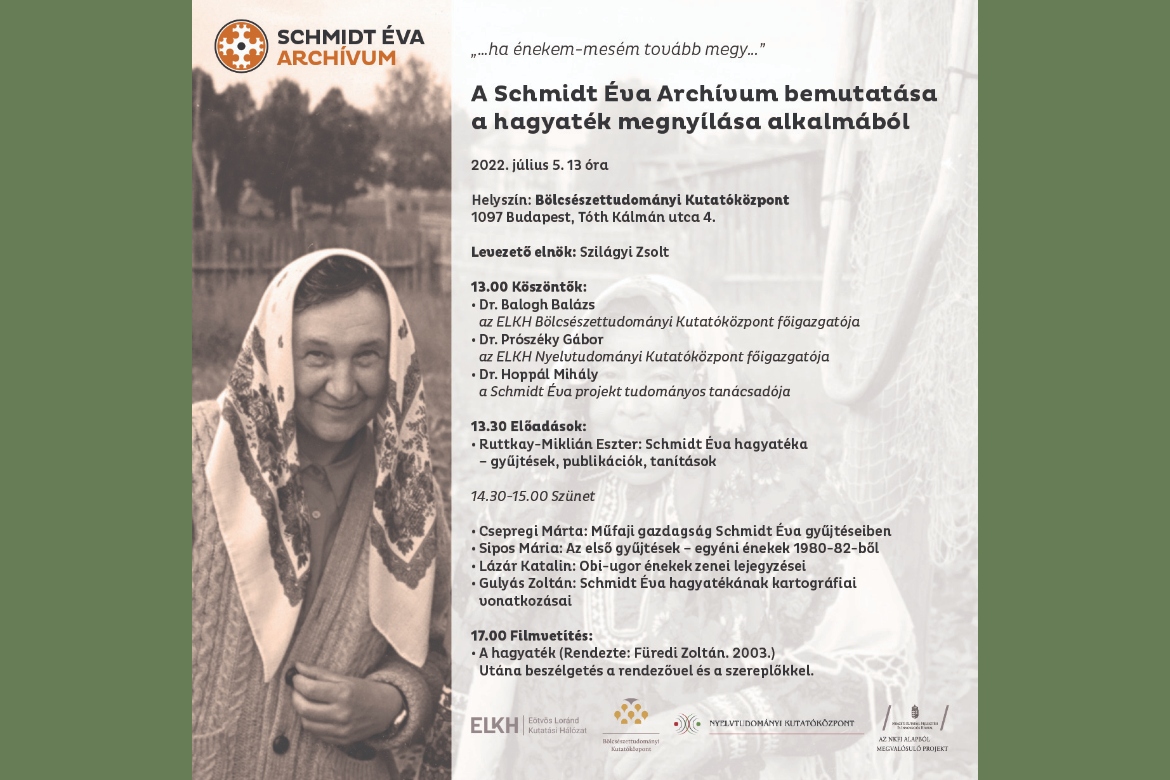- Title of the project: Organizing, processing, and publishing the research legacy of Éva Schmidt
- Duration of the project: January 1, 2022 – December 31, 2024 [Planned extension until December 31, 2025]
- Project manager: Zsolt Szilágyi
- Project type: NKFIH
- Funding organization: National Research, Development and Innovation Office
- Project number: 2020-2.1.1-ED-2021-00189
Ethnographer, folklorist, and linguist Éva Schmidt worked in Beloyarsk in Northwestern Siberia from 1991 to 2002 under a Russian-Hungarian intergovernmental agreement. Her work resulted in a uniquely valuable collection of Khanty linguistic, ethnographic, folkloristic, and religious studies. This project aims to organize, process, and make accessible the research legacy of Éva Schmidt. While the preparatory phase was directed by the Centre for Linguistic Research and funded by HUN-REN (formerly Eötvös Loránd Research Network), the present project is the first stage of the detailed processing of the legacy, jointly implemented by the HUN-REN Research Centre for the Humanities and the HUN-REN Research Centre for Linguistics.
The specific goals of the project: (1) as preparatory work (HUN-REN Research Centre for Linguistics), the compilation of content on Éva Schmidt's research career for a future website; (2) selection and publication of texts online and in traditional offline formats, with particular attention to prose genres; (3) neural network processing of Khanty texts; (4) scientific processing and dissemination concurrently with publication; (5) presentation of Obi-Ugric cultural content that can be effectively conveyed in educational genres.
The tasks are based on a set of principles – largely related to the original ideas of Éva Schmidt – which determine how the subtasks are carried out. (1) Due to the private and sacred nature of the genres, the processing must consider Khanty cultural values and norms (consultations with Khanty partners). (2) The method of publication must make visible the complexity of folklore works (language technology support). (3) The future website must also provide the internal context of the published collections (informant, collection site, genre, dialect, bibliographic references, etc.) (language technology support). (4) The published materials must be accessible to Western scholarship as well as Russian-speaking readers, especially to the linguistically assimilated Khanty community maintaining a Khanty identity (English and Russian translations). (5) The material must be published in a form that is accessible to as many disciplines as possible.
In the planning phase, we assigned an important role to native speakers, our Khanty colleagues, but the changing international situation has created serious obstacles beyond our control, which we are working to overcome. In the use of resources, we have adapted to the changing situation and rescheduled sub-tasks where possible. Nonetheless, this does not change the original objectives of the project.


